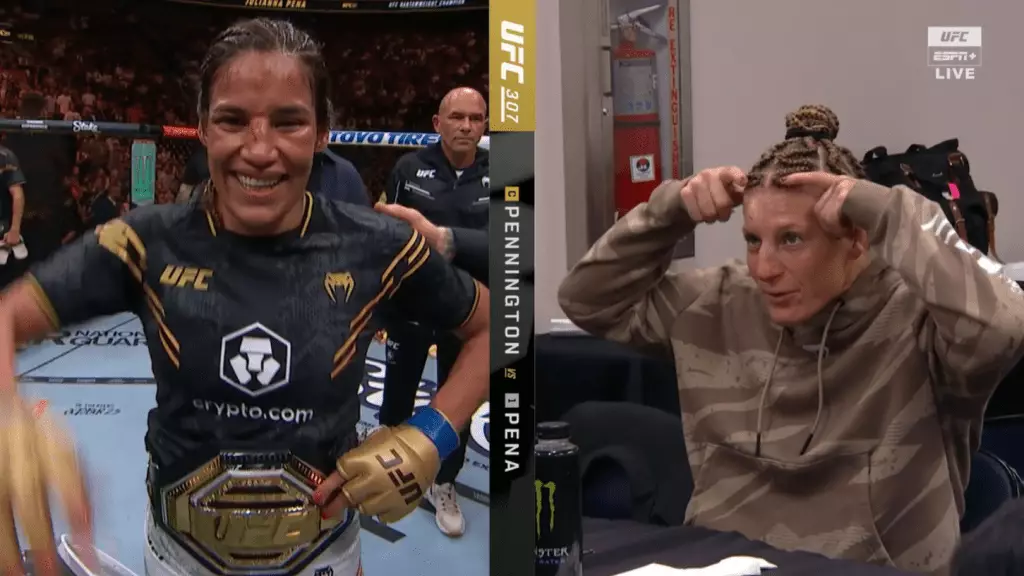The world of mixed martial arts (MMA) is as much about psychological warfare as it is about physical prowess. Post-fight rhetoric can often shape the trajectory of a fighter’s career, and Julianna Peña’s recent call-out of Amanda Nunes following her win at UFC 307 raises questions regarding the sincerity and strategic intent behind such statements. Chael Sonnen, a veteran analyst, has been vocal in questioning the authenticity of Peña’s remarks. Let’s dissect the implications of her call-out in the context of the ongoing narratives in women’s bantamweight MMA.
Peña’s moment came after a fiercely contested bout against Raquel Pennington, where she reclaimed the women’s bantamweight title via split decision. The excitement in the arena was palpable, and naturally, the post-fight interview with Joe Rogan steered the conversation towards the next possible challengers. While Kayla Harrison was the name on everyone’s lips leading into the event, Peña chose to divert the narrative. Instead of acknowledging the looming presence of Harrison, who had previously established herself as a formidable contender, Peña’s focus shifted towards Nunes, who announced her retirement earlier.
The unpredictability of Peña’s call-out surprised many observers, given that Nunes is not active in the division anymore. This maneuver invites deeper scrutiny of Peña’s motivations. Is she genuinely calling out Nunes, or is it a deft strategic move meant to redirect focus from a potentially more challenging fight with Harrison?
The Kayla Harrison Factor
Leading into UFC 307, Kayla Harrison was earmarked as the next viable title challenger. Her position was solidified not only by her accolades but by her performance as a backup fighter. Dominating Ketlen Vieira showcased her capability, firmly establishing her presence in the UFC. In the age of matchmaking politics, fighters are often spotlighted based on narrative threads that promoters want to weave. However, Peña’s decision to overlook Harrison in favor of a retired champion poses a perplexing narrative twist, suggesting a calculated attempt to avoid an immediate confrontation with a well-prepped opponent.
Sonnen’s comments about Peña’s statements being a “troll job” underscore a recurring theme in MMA—fighters sometimes employ diversionary tactics to manage their career pathways. Just as Sean O’Malley similarly called out an alternative competitor rather than addressing the frontrunner, Peña’s behavior fits a larger pattern of strategic misdirection that can generate buzz without immediate consequences.
As the MMA community digests Peña’s call-out, it brings to light the nature of the bantamweight division and the fighters who wish to carve their names within it. While Peña publicly supports her call-out as earnest, implying that Nunes’ perceived indecision mirrors her own uncertainty regarding the direction of her career, the reality is that pursuing a fight that may not materialize is a risky game.
Additionally, the controversial judging in Peña’s recent fight against Pennington leaves the door open for a potential rematch. Many—Sonnen included—believe that Pennington may have been the rightful winner of that clash. To skip over that unresolved tension in favor of a talk about Nunes could imply that Peña is keen on maintaining her title while avoiding potential scrutiny.
In the ever-evolving landscape of the UFC, where fighters must juggle their athletic performances and promotional personas, Peña’s call-out to Nunes may reflect a calculated risk. Sonnen’s critique provides insightful commentary on how fighters can navigate the intricate web of competitor relations, public perception, and personal ambition. As fans and analysts alike await this drama’s next chapter, it remains to be seen if Peña will eventually confront the most potent threats in her division, like Harrison, or continue to engage in narratives that might distract from her contemporaries. In a sport full of uncertainties, one thing is clear: the battle for narrative supremacy is just as fierce as the physical confrontations within the Octagon.

